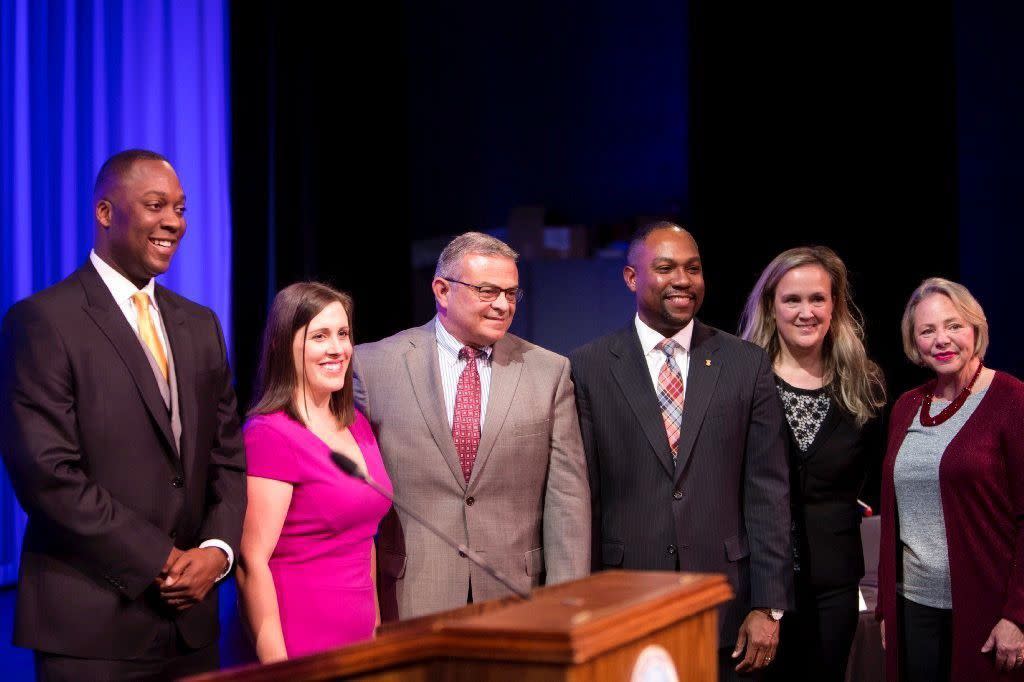Howard County makes a mess of campaign finance | COMMENTARY

- Oops!Something went wrong.Please try again later.
There is an old saying among the deeply cynical that when government screws up and it’s either the result of elaborate political scheming or simple blunder, put your money on the latter. Machiavellian manipulations are tough to pull off, but there’s seldom any shortage of unintended errors in the public sector. Yet, when the mistake in question involves the public financing of political campaigns, and the people voting on the issue are among its chief beneficiaries, it’s tough to be certain. And that’s why members of the Howard County Council and County Executive Calvin Ball currently find themselves in an embarrassing mess that is at least partially of their own making. Either they screwed up accidentally, or they did so deliberately. The smart money is still on mistake, but you never know.
Here’s the background: In 2016, Howard voters approved a charter amendment creating a voluntary Citizens’ Election Fund for candidates for county office. The concept is simple, and is already being replicated elsewhere in the state. Candidates collect small donations for their campaigns in order to qualify for matching funds from county government. It reduces the political clout of deep-pocketed special interest groups who write big checks to candidates, and the system can also help political newcomers defeat more established or financially connected figures. The measure was passed by the council, which had to pull together a supermajority to overturn a veto by then-County Executive Allan Kittleman (and more on that in a moment) to do it. And an independent commission was formed to iron out specifics, allowing the system to go into full effect for the 2022 election.
And here’s where the train goes off the tracks: Last October, some folks noticed an apparent drafting error in the law that mistakenly set an August deadline to determine who was eligible to participate. What nobody seemed to notice is that such an early deadline would mean nobody would qualify for public financing in the primary election when such funding is frequently most vital. Why? Because the race has to be contested, and most candidates don’t file that early. Thus, when council member Deb Jung applied recently for matching funds totaling more than $40,000, the county’s director of finance refused her application, citing the deadline. She did not have an opponent five months ago. Her primary opponent did not file until much later.
Of course, the provision might have been fixed three months ago when it was discovered. But nobody rushed in to file legislation to amend the law, including County Executive Ball, a Democrat who has supported the measure in the past and has been curiously silent about it in recent months. And here’s another curiosity: That indifference would seem to serve Mr. Ball’s political interests. The reason? Who is running for county executive using public financing? That would be Mr. Kittleman, the veto-wielding Republican. Of course, it might also be pointed out that council members were just as slow to take action, too.
At a hearing Tuesday night, the extent of the problem was made clear; the likelihood of a quick fix, not so much. Ideally, the County Council would pass emergency legislation on Feb. 7 but they may not have the four out of five votes. If, as expected, they approve the fixative amendment soon as normal business, the earliest the funds can be released will be on April 7, which is not ideal given the primary election is June 28.
What Howard County voters deserve is a working campaign finance law. And it should have applied to primaries from the start — just as other jurisdictions have done. Whatever the cost, it should not be a sticking point considering how much greater the expense when government is dominated by special interests, which, on the county level, often means developers. County officials had six years to get a working program in place, and they still could not meet the deadline. It’s curious that Montgomery County, which already has such a program, hasn’t had such a snafu. We expect others that have them in the works, including Baltimore City and Baltimore and Prince George’s counties, will surely avoid this pitfall.
Perhaps worst of all in this scenario is the message this sends to other counties (such as Anne Arundel, where a similar measure is on the ballot this fall) that public financing is either unworkable or amounts to a slush fund for politicians who manipulate the system to their benefit. It isn’t either of those things, of course, not when it’s constructed properly. To err is human, to drag one’s feet on setting matters right is less forgivable.
Baltimore Sun editorial writers offer opinions and analysis on news and issues relevant to readers. They operate separately from the newsroom.

